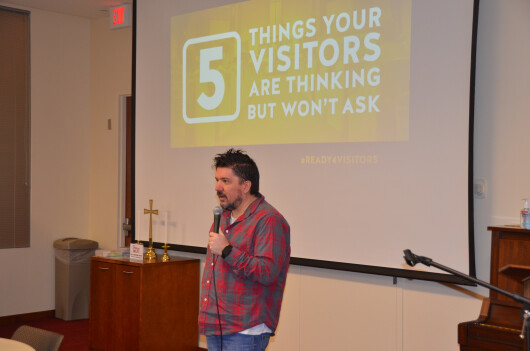Five questions church visitors think*
By Erik Alsgaard
The ministry  of hospitality is a critical element of making disciples of Jesus Christ for the transformation of the world. Or so says Jason Moore, who presented his workshop “5 Things Your Visitors are Thinking but Won’t Ask,” in the Baltimore-Washington Conference. The event was made possible by the Office of Leadership and Congregational Development of the BWC.
of hospitality is a critical element of making disciples of Jesus Christ for the transformation of the world. Or so says Jason Moore, who presented his workshop “5 Things Your Visitors are Thinking but Won’t Ask,” in the Baltimore-Washington Conference. The event was made possible by the Office of Leadership and Congregational Development of the BWC.
In what he termed a “wake-up call” for churches, Moore’s hope is that people will see their church building with new eyes: those of a first-time visitor.
“We have to be poised for visitors,” Moore said. “That means we have to plan ahead because it’s too late to prepare when they walk in the door.”
There are two parts to the experience of Sunday morning, Moore said: creating a really great
“Some of us think that great worship is enough to keep people coming,” Moore said. “But you have to find a balance between creating the excellent worship experience and excellent hospitality. Above all, more than anything, what we do in church should be relational, not transactional. Relationships grow disciples and grow churches.”
Hospitality, Moore said, means putting yourself in the shoes of first-time visitors to your church. He walked participants through the five (plus one bonus) questions visitors ask, questions he distilled from his many visits as a “mystery
“Where am I supposed to go?” is the first question. And the answer to that, he said, starts with the church’s website.
Websites, he said, are your church’s “new front door.” It should have worship times and descriptions; location information including a clickable link to a Google map; some information about staff and a vision for ministry; and it must be accurate and up to date.
Moore recommended three companies that will build and host a website; they all vary in price and complexity.
In lieu of a website, a church could easily build a Facebook Page, he said. But it, too, needs to be accurate and up to date.
Once they arrive at your church, the next phase of hospitality begins. How are the signs at your church?
“Start in with the sign out front of your church,” he said. “Is the information there current and accurate?”
Sprinkling his talk with anecdotes both humorous and poignant, Moore showed photographs of some church signs – both exterior and interior – that somehow missed the mark.
“Ask yourself,” Moore said. “Do these signs honor the building you have?” Noting that many churches have old, outdated, or torn-paper signs, Moore encouraged his audience to look afresh at how people are directed to move from the parking lot to the sanctuary.
The second question is, “Who are these people?” This is important, Moore said, because when visitors get to church, they encounter people they don’t know. In answering this question, churches often supply name tags for members, train greeters to be welcoming people, and ask visitors to stand and shake hands during the “Passing of the Peace.”
(Consider moving the “Passing of the Peace” to the end of the worship, Moore advised, so that visitors who might be uncomfortable with shaking hands can slip out the back.)
The third question, “When do we actually start and stop?” is easy to overlook. Many churches change worship times during the summer, or for special occasions. It is important that those changes be made on all your platforms, Moore said, including the church website, its social media channels, the sign outside, and in the bulletin.
Fourth for visitors is answering the question, “What’s been happening up until now?” Let’s say you have a pastor who is in the middle of preaching a six-week Lenten series, and some visitors show up on week four, Moore said. “Sometimes we think that people have been tracking along with us; that they’ve been part of our community,” he said. “We have to make sure that we catch people up.”
And the fifth question may be the most important: “I’m supposed to do what?”
“We have all these rituals and things that we do in church that go unexplained,” Moore said. “These can make visitors feel very uncomfortable.”
And the bonus (sixth) item isn’t really a question, but a statement. “Excellence matters,” Moore said. “It matters more for visitors than it does for regulars because the regulars already love each other; visitors don’t yet love us.”
Thus, when things don’t go well in worship – the singers are off-key; the message isn’t synced with the video screens (or they don’t work) – or if the building is dirty, cluttered, and has that infamous “church musty” smell, visitors will judge the church more harshly than regulars, Moore said.
“Our attention to detail is an indicator of how intentional the church is going to be in the way we are in relationships with others,” Moore said. “If you’re not intentional about your signs, are you intentional about my growth as a disciple of Jesus?”
Moore recommends three books for church leaders who want to go deeper
- Five Practices of Fruitful Congregations, by Bishop Robert Schnase
- Clip In: Risking Hospitality in Your Church, by Jim Ozier and Fiona Haworth
- Get Their Name, by Bob Farr, Doug Anderson
and Kay Kotan
*but are afraid to ask
